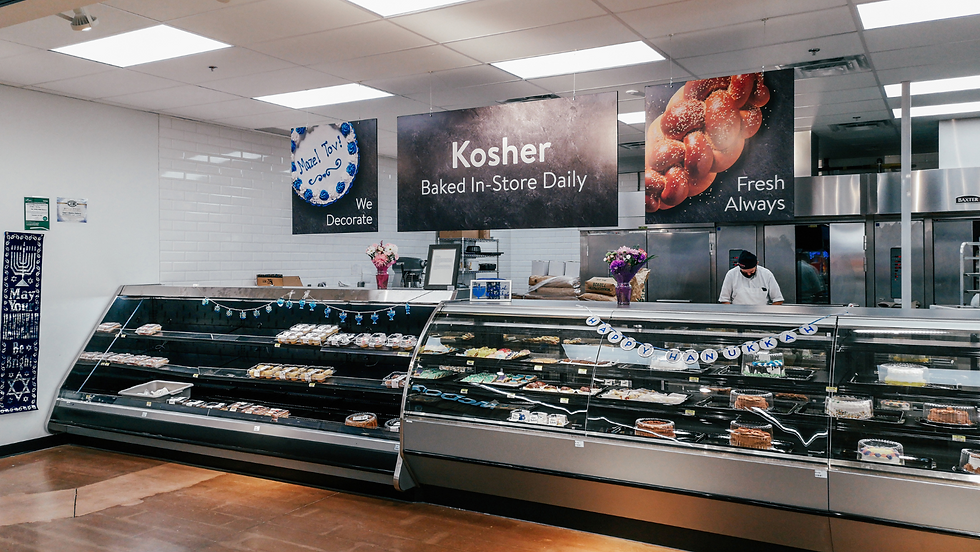
There are a wide array of kosher certification symbols, AKA hechshers, that appear on food products, beverages, and dining establishments’ menus. The sheer number of these stamps of approval can be mind-blowing, even to people who are well-versed in the kosher laws.
Though the four largest kosher supervision agencies in the world all originated and are headquartered in the United States, their symbols, "OU," "Kof-K," "OK," and "Star-K" are recognized kosher certification symbols used around the world.
The US also leads the world in the number of regional kosher certifiers it supports. Many states have at least one kosher supervision agency; states with large Orthodox communities like California, New York, New Jersey, and Florida often have several.

Kosher Laws
The laws of kosher that date back over 3300 years, are intricate and extensive, detailing which foods Jewish people are permitted to eat and the ways in which they may be prepared. Because kosher laws require keeping meat and dairy separate, kosher products always specify whether or not they are meat (fleishig), dairy (milchigor chalavi) or pareve (containing no meat or dairy).
Although the essential laws have not changed since they were given to Moses at Mount Sinai, advancements in modern processing require expertise in both kosher law and food technology.

What it Means to be Kosher Certified
There is a mistaken belief that certified kosher food is that which has been blessed by a rabbi, however it’s more complicated than that. Kosher certification refers to the process by which rabbinical experts verify that food products are prepared in accordance with kosher law. The certifying agency tracks and monitors the product’s status through record-keeping and periodic audits.
The Purpose of a Kosher Certificate
A kosher certificate confirms that a product is properly vetted from the perspective of kosher law. It also alerts consumers to any specific kosher category such as dairy, meat or Kosher Passover. For restaurants, kosher certification is a regulatory seal which increases the appeal of their menu to a wider market, and is a huge selling point.

Kosher Symbols and Certification
When a product is kosher certified, all ingredients in the product and the process of producing the product must comply with strict kosher policies. There are two kosher dietary laws.
Kosher pareve products must not contain milk, meat, nor any of their derivatives. In other words, kosher pareve products are dairy-free and meat-free, at least by ingredients.
Meat and meat derivatives may never be mixed with milk or milk derivatives. Separate equipment for the preparation and storage of meat-based and dairy-based foods must be used. This means that kosher meat must be dairy free.
Products that are kosher certified will bear a kosher symbol. A plain symbol is usually an indication that the product is certified kosher pareve. A symbol with the word “Pareve,” “Parev,” or “Parve” is confirmation of that certification.
Just as with food products, eating establishments are only certified when displaying a valid kosher certificate.

OK Kosher Certification
The OK Kosher trademark is a bold K in a circle, a trusted sign known around the world. Products are endorsed as kosher by OK Kosher only when bearing the OK symbol on the label and with a valid OK Kosher Certificate™.
Though all kosher certifying agencies share the goal of verifying and ensuring kosher law is adhered to, each one of these agencies around the world has its own policies and procedures. Consumers, retail buyers and suppliers choose what products to buy based on the standards and reliability of the certifying agency. The familiarity of the trademarked kosher symbol is the visual connection to the certifying agency of choice.
OK Kosher is the world’s largest independent kosher certification agency and the symbol is one of the world’s most valuable and recognizable kosher logos, trusted by consumers around the world.

The OK Kosher Certification™ Mark is a registered trademark exclusively licensed to OK Kosher. OK Kosher Certification™ is the exclusive licensee of its federally and internationally registered trademarks for kosher certification. The symbol may not be used until a written contract has been executed.
Kosher supervision and its associated kosher symbol, or certification mark are two distinct things. In fact, there is a great deal of information (and misinformation) out there about what letters and symbols a company is allowed to print on their labels to signify kosher.
Even the letter K itself becomes questionable when referring to a product’s kosher status.

Obtaining OK Kosher Certification for Restaurants
Before we dive into the certification process, let's explore some of the amazing kosher restaurants Miami has to offer. Check out our guide to the best Kosher Restaurants In Miami.
Though it may seem obvious, many businesses are not aware of the legalities behind the use of the OK Kosher symbol.
Because the OK Kosher symbol is a registered certification mark licensed exclusively used by companies and products with OK Kosher Certification, it is a mistake to assume that it’s okay to use it on your printed or online menu, website, or social media marketing. Though it may be legal in certain places to print a plain or unbranded letter K on a menu because plain letters of the alphabet aren't trademarkable, the OK Kosher Certification Mark (a K in a circle) is a registered trademark in the United States and in many other countries.
Putting it simply, it is illegal to use the OK Kosher Symbol unless you are a registered, certified OK Kosher client. But, the good news it that the process for obtaining this certification is pretty straightforward.
If you are a restaurant interested in obtaining OK Kosher Certification, simply head to the OK Kosher application for restaurants and caterers.


By Eileen Strauss

Коментарі